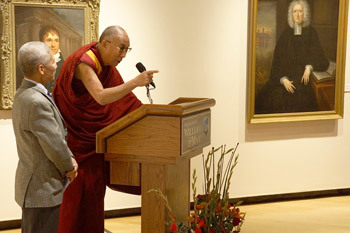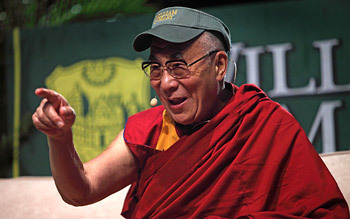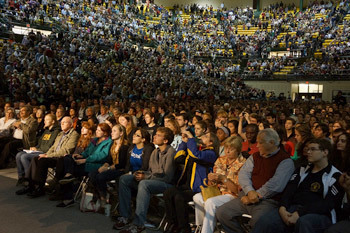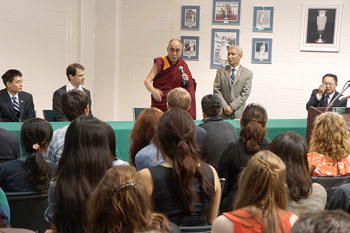Williamsburg, VA, USA, 10 October 2012 - Following a short flight from Syracuse, His Holiness was met at the airport on arrival at Williamsburg by Professor of Religious Studies, Kevin Vose and Jeremy Martin, from the President’s Office. He was then greeted at his hotel by Clyde Haulman, Mayor of Williamsburg. He rested, ate lunch and drove to the Muscarelle Museum where College Rector, Jeff Trammell introduced him to a group of the University’s guests. He responded,

|
His Holiness the Dalai Lama speaking during his visit to the Muscarelle Museum of Art in Williamsburg, VA, on October 10, 2012. Photo/Jeremy Russell/OHHDL
|
“I am very happy to be here, even for a short visit, at the country’s second oldest college. A lot of people down the years have worked hard to make a contribution to the community here.”
He told the assembled dignitaries that wherever he goes he tries to fulfil three commitments. The first is the promotion of human values, the idea that we need to have concern for others because we are all part of humanity and we all want to be happy. The second is the promotion of inter-religious harmony. All religious traditions seek to convey the same message of love, compassion and tolerance. When religious traditions themselves become the cause of conflict, it is, as a Tibetan saying goes, as if medicine has become poison. Such strife is the result of ignorance, whereas harmony should be founded on mutual respect. The third commitment involves Tibet, but since last year, His Holiness explained, he has finally given up all political responsibility to an elected leadership.
Invited to address more than 8000 students of the College of William and Mary on the topic of human compassion His Holiness began as follows:
“Dear brothers and sisters - I always start like this because we are sometimes inclined to place too much emphasis on status and rank, whereas in fact we are all fundamentally the same. Now there are also problems that affect us all. Look at the threat of climate change and the economic problems that affect everyone.”

|
His Holiness the Dalai Lama being speaking during his talk at the College of William and Mary in Williamsburg, VA, on October 10, 2012. Photo/Stephen Salpukas/College of William and Mary
|
Some people say that history repeats itself, but His Holiness doesn’t agree. In his view one of our errors is to tackle new problems in an old way. For example, the intention to remove a dictator in Iraq and install democracy was well motivated, but the use of force was an out of date solution that brought further problems in its wake. His Holiness stresses the importance of assessing the situation and adopting a realistic approach.
Regarding the reality that as human beings we are all the same, he cites the case of doctors who don’t ask sick patients about their religious beliefs, their racial background, their level of education, but simply regard them as people who need treatment. He suggests that we need to extend this kind of approach to many other situations.
Invited to speak about human compassion, His Holiness made clear that not only human beings, but other mammals also show care and concern for their young. This is ordinary, biological and somewhat biased compassion. On the other hand, when we apply our human intelligence we can extend our love and compassion infinitely, even to the extent of developing compassion for our enemies. This ability to analyze and plan ahead to assure our long term interest is something only human beings can do. However, if we allow ourselves to develop anger, we cannot use our intelligence properly. Therefore, we should train our minds.

|
The audience at the College of William and Mary's Kaplan Arena listening to His Holiness the Dalai Lama as he during his talk in Williamsburg, VA, on October 10, 2012. Photo/Jeremy Russell/OHHDL
|
“I really feel that some people neglect and overlook compassion because they associate it with religion. Of course, everyone is free to choose whether they pay religion any regard, but to neglect compassion is a mistake because it is the source of our own well-being.”
He concluded, “Please don’t think of the practice of compassion and loving-kindness only as a religious practice; it is a practical way of fulfilling our own interests.”
Among the questions put to him was one about the relevance of the story of the Buddha’s life in the twenty-first century. He referred to the Buddha’s admonition to his followers not to accept what he said simply out of faith, but to examine, investigate and analyze it. He said this kind of healthy scepticism is very helpful here and now.
Following his public talk, His Holiness met with a group of students from the University that included students from China. He told them that although the twentieth century, which he often characterizes as a period of bloodshed, is over, we shouldn’t think the twenty-first century will be without problems. The crucial point though will be to approach them differently. The only realistic way to resolve problems with others is through dialogue.

|
|
His Holiness the Dalai Lama addressing a group of students, including some from China, during his visit to College of William and Mary in Williamsburg, VA, on October 10, 2012. Photo/Jeremy Russell/OHHDL |
Asked by a Chinese student if the demonstrations that swept across Tibetan areas in 2008 were not just an excuse for Tibetans to attack Han Chinese, His Holiness reviewed some of the history of the past 60 years. He recalled that before the uprising of 1959 many Tibetans were complaining about the policies of high-handed Chinese officials. He spoke about how trust had been breached and when uprisings began in ‘55 and ‘56 the response was naked suppression. There was no effort to listen to people’s sense of resentment. Having been encouraged by Mao Zedong to contact him directly in case of trouble, His Holiness wrote letters to him three or four times, but received no reply.
“Two years ago a Chinese friend came to visit me and before that deliberately went to Tibet so he could report what he found there. In Lhasa he noticed Tibetans performing prostrations in front of the Jokhang and right next to them troops went through noisy exercises without any regard or respect. My friend said that if there are any splittists in Tibet, they are Chinese like these.”
As the meeting came to an end, His Holiness advised the students directly:
“Our Han brothers and sisters, many misunderstandings have been put about by the Chinese government; don’t believe them. We respect the Han people; we respect your rich and ancient culture. But we are not barbarians. We too have a culture and history. We have our own written and spoken language. We are looking for a solution that is mutually acceptable. We are looking for the autonomy that is guaranteed by the Chinese constitution. Please study the situation in a more holistic way, take a broader view. While you are here in a free country, take the opportunity to use both your eyes and both your ears and learn about the world we live in. Thank you.”
















